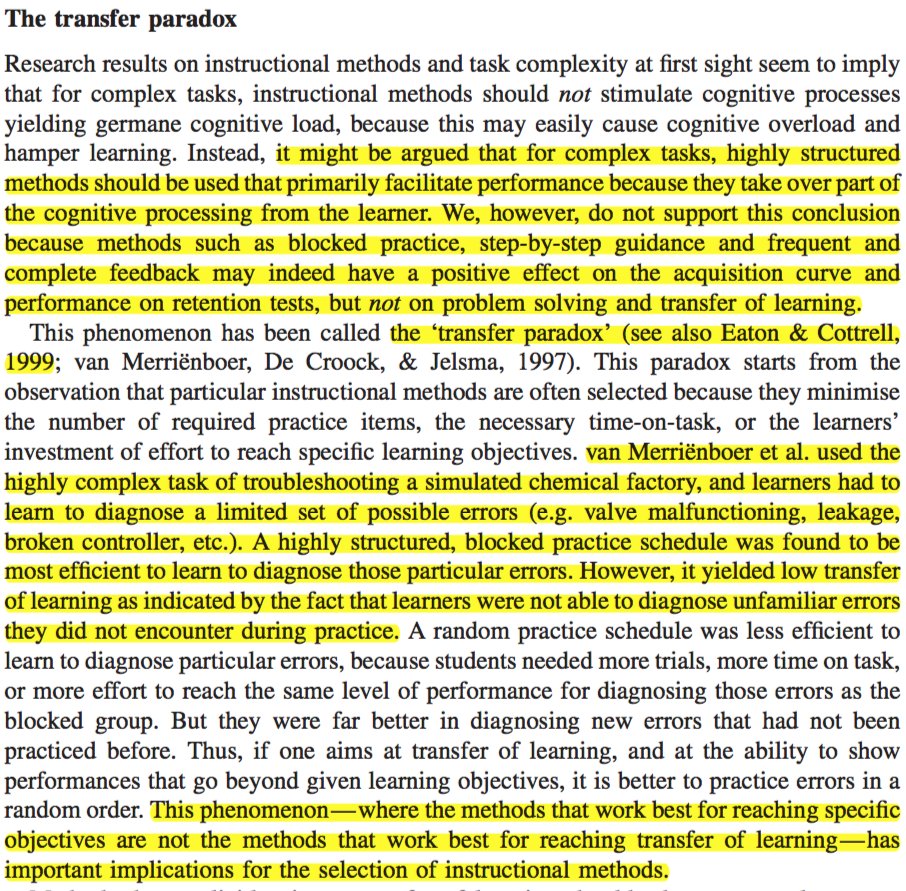I was amazed this week when reading about the transfer paradox. I’ve put some chosen excerpts of this article as my No.1 takeaway for this week. You can see them below.
I also really enjoyed Harry Fletcher-Wood’s concise piece on considerations regarding moving learners from novice to expert status. Harry includes in his piece some interesting medical examples, with implications for teachers.
Some immediately actionable changes to multiple choice questions are outlined in takeaway 3. I’ve already applied some of these in writing an upcoming test for my physics students.
Takeaway 4 is an interesting article by Dylan Wiliam about some of the limitations of education research (specific comments made about class size research), with some sensible advice about what edu research can be used for, despite these limitations.
The final three takeaways speak for themselves. That said, I’ll be looking at the intervention outlined in takeaway 7 in more detail. Could this help my Y12 students deal with stress?
Enjoy the read.
(all past TOTs here), sign up to get one of these emailed to you each week here.
The transfer paradox. When efficient communication of concepts is less efficient
Having my mind blown by the ‘transfer paradox’. Van Merrienboer, J. J., Kester, L., & Paas, F. (2006). Teaching complex rather than simple tasks: Balancing intrinsic and germane load to enhance transfer of learning. Applied Cognitive Psychology, 20(3), 343–352.

Here’s how they suggest getting around this challenge

However, there’s a key point here. the cognitive space that you free up through your load reduction instruction MUST be utilised to increase germane load.

Here are some great questions to consider when you’re trying to do this.

And here are some studies that used prompts, problem type description, and infrequent feedback in order to do this. I’ll be checking these out

This idea of using freed up cognitive space for more purposeful and targeted schema building on the part of my learners has prompted a lot of thinking for me. Looking forward to diving more into the nitty gritty of how to do this!
Supporting learners to move from novice to expert, via @HFletcherWood
Novice to expert? Outlines some fantastic questions to struggle with! https://t.co/mJmhZhTsNe via @HFletcherWood pic.twitter.com/jBgJwNlHqX
— Oliver Lovell (@ollie_lovell) March 14, 2018
Considerations for writing good multiple choice questions
(Note: The full 12 page summary of research on multi-choice Qs is here)
A review of the research on how to write good multiple choice questions. https://t.co/DCUIadbhSR pic.twitter.com/OB1gkTX8oC
— Oliver Lovell (@ollie_lovell) March 9, 2018
What’s education research good for? via @DylanWiliam and @the RSAorg
Whilst Edu-research is plagued with confounding factors, it can help us determine 1. what doesn’t work, 2. what’s the likely return on investment, 3. What’s conditions are required for impact 4. What’s likely most impactful. @dylanwiliam for @theRSAorg https://t.co/rgtBppCfxk
— Oliver Lovell (@ollie_lovell) March 12, 2018
How can calling a task a ‘draft’ increase academic risk taking? via @ddmeyer
Rough-Draft Talk. A @ddmeyer blog post with 2 really great ideas in it (maybe more) https://t.co/gKVcuYNLhD pic.twitter.com/Z2X2OKSHcD
— Oliver Lovell (@ollie_lovell) March 11, 2018
Fifty writing prompts to get your students thinking, via @edutopia
Some pretty interesting writing prompts (or conversation starters at the party…) https://t.co/BcDbmwXzSR pic.twitter.com/5N3VwVw5eM
— Oliver Lovell (@ollie_lovell) March 13, 2018
An intervention that could help students deal with the stresses of Y12
In contrast to my previous tweet encouraging results from an online CRT program. Only 7 x 30 minute modules. https://t.co/XBGT3S5dI9
— Oliver Lovell (@ollie_lovell) March 15, 2018